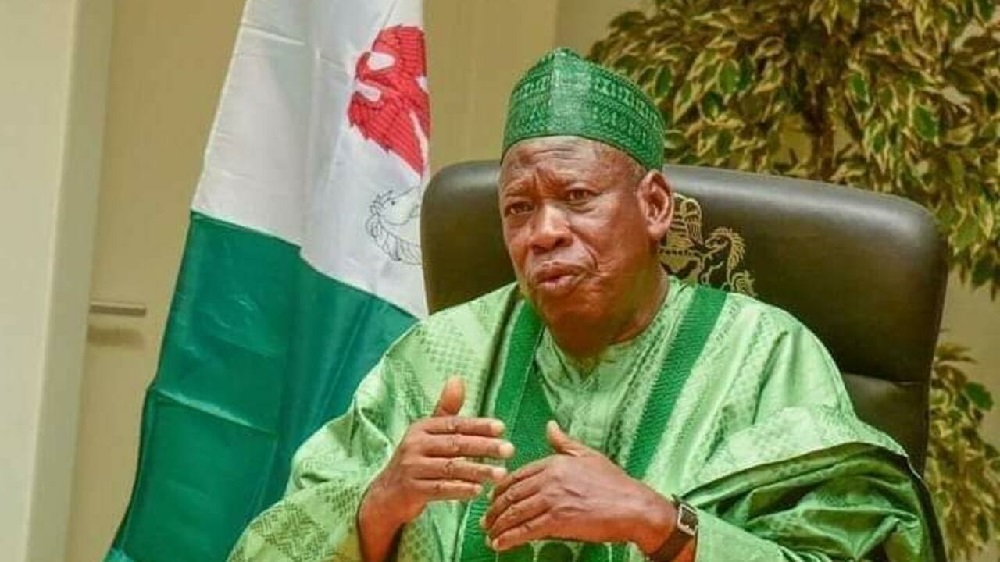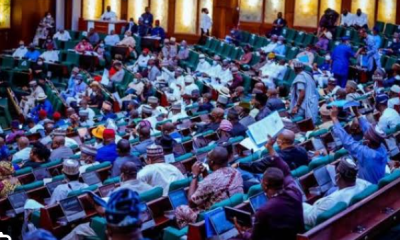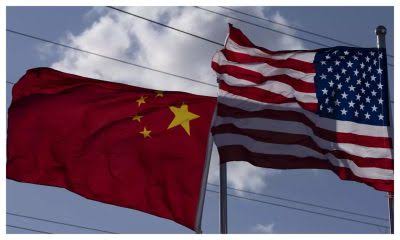News
Trump Launches ‘Reciprocal Tariffs’ Targeting Allies, Adversaries

US President Donald Trump inked plans Thursday for sweeping “reciprocal tariffs” hitting both allies and competitors, in a dramatic escalation of an international trade war that economists warn could fuel inflation at home.
Speaking in the Oval Office, Trump said he had decided to impose the reciprocal duties, telling reporters that US allies were often “worse than our enemies” on trade issues.
The levies would be tailored to each US trading partner and consider non-tariff factors including value-added tax (VAT).
“Major exporting nations of the world attack our markets with punishing tariffs and even more punishing non-tariff barriers,” Trump trade advisor Peter Navarro told reporters, taking aim at the European Union in particular over VAT.
Washington will start by examining economies with which the United States has its biggest deficits or “most egregious issues,” said a White House official.
“This should be a matter of weeks, in a few months, but not much longer than that,” the official added, speaking on condition of anonymity.
Trump acknowledged Thursday that US prices “could go up” due to tariffs, but he expressed confidence that they would ultimately ease.
Trump has announced a broad range of tariffs targeting some of the biggest US trading partners since taking office, arguing that they would help tackle unfair practices — and in some cases using the threats to influence policy.
The president has referred to tariffs as a way to raise revenue, remedy trade imbalances, and pressure countries to act on US concerns.
The White House official said Thursday that the United States has been “treated unfairly,” saying a lack of reciprocity is a reason behind the country’s “persistent annual trade deficit in goods.”
With the memo Trump signed on Thursday, the US Trade Representative, commerce secretary and other officials will work to propose remedies on a country-by-country basis.
Trump’s announcement came hours before he was due to meet Indian Prime Minister Narendra Modi in Washington.
Analysts have warned that reciprocal duties could bring a broad tariff hike to emerging market economies such as India and Thailand, which tend to have higher effective tariff rates on US products.
Countries such as South Korea that have trade deals with Washington are less at risk from this move, analysts believe.
Inflation concerns
Cost-of-living pressures were a key issue in the November election that saw Trump sweep to power, and the Republican has promised to swiftly reduce prices.
But economists caution that sweeping tariffs on US imports would likely boost inflation, not reduce it, in the near term and could weigh on growth eventually.
Trump’s deputy chief of staff for policy Stephen Miller previously said countries use the VAT to get an unfair trade advantage, although analysts have challenged this characterization.
During election campaigning, Trump promised: “An eye for an eye, a tariff for a tariff, same exact amount.”
For example, if India imposes a 25-percent tariff on US autos, Washington will have a 25-percent tariff as well on imports of autos from India, explained a Nomura report this week.
The consideration of non-tariff factors might shift this calculus.
Modi will hold talks with Trump on Thursday and New Delhi offered some quick tariff concessions ahead of his visit, including on high-end motorcycles.
“Trump’s objective of implementing reciprocal tariffs is to ensure fair treatment for US exports, which could indirectly also address US trade imbalances with partner countries,” analysts at Nomura said.
Among Asian economies, India has a 9.5-percent weighted average effective tariff on US exports, while there is a three-percent rate on India’s exports to the United States.
Thailand has a 6.2-percent rate and China a 7.1-percent rate on US products, Nomura noted.
Higher tariffs are often imposed by poorer countries, who use them as a tool for revenue and protection because they have fewer resources to impose non-tariff barriers, Cato Institute’s Scott Lincicome earlier told AFP.
AFP
News
AMMC Partners NUJ-FCT On Infrastructural Development

News
UBEC plans new template for basic school fund disbursement

The Universal Basic Education Commission on Tuesday announced plans to introduce a new template for disbursing counterpart funds under the Universal Basic Education programme.
This was disclosed by the Executive Secretary of the commission, Aisha Garba, during an interactive workshop with State Universal Basic Education Boards in Abuja.
Garba explained that the Federal Government, through UBEC, had recently restructured the delivery of basic education nationwide to align with four strategic pillars aimed at improving access and quality across states and the Federal Capital Territory.
She identified the pillars as expanding access to basic education, especially for rural and underserved populations; enhancing the quality of teaching and learning nationwide; strengthening accountability and the effective use of education financing; and optimising monitoring and institutional systems for quality service delivery.
She said, “The Hope Education Project of the present administration is a performance-for-reward initiative designed to support states that judiciously utilise resources in line with these four pillars.”
She added that the new approach had made it necessary to develop fresh templates that will guide SUBEBs in preparing work plans to access UBE intervention funds under the framework of the Hope Education Project.
Also speaking at the event, UBEC’s Deputy Executive Secretary for General Services, Tunde Ajibulu, described the workshop as timely and essential.
He stressed that the realignment of basic education delivery made the introduction of the new templates crucial.
“We expect you, as implementers of basic education in your respective states, to contribute positively and help develop workable templates,” Ajibulu said.
News
Ganduje loses bid to quash $413,000, N1.8bn bribery charges

A Kano State High Court on Tuesday dismissed an application filed by former Kano State Governor and current National Chairman of the All Progressives Congress, Dr. Abdullahi Ganduje, challenging the court’s jurisdiction to hear a bribery and misappropriation case against him.
The Kano State Government brought 11 counts against Ganduje, his wife Hafsat, son Umar, and five others, alleging bribery totalling $413,000 and misappropriation of N1.38 billion.
The other defendants include Abubakar Bawuro, Umar Abdullahi Umar, Jibrilla Muhammad, Lamash Properties Limited, Safari Textiles Limited, and Lasage General Enterprises Limited.
Delivering her ruling, Justice Amina Adamu-Aliyu dismissed all preliminary objections raised by the defendants, describing them as incompetent and lacking merit.
She ruled that the charges filed on May 13, 2024, were competent and that the matter should proceed to trial.
The judge further issued a summons to the sixth defendant, Lamash Properties Limited, and adjourned the case to July 30 and 31, 2025, for hearing.
Ganduje, his wife Hafsat, and son Umar, had through their lawyer, Mrs. Lydia Oyewo, filed a preliminary objection dated November 18, 2024, challenging the court’s jurisdiction and seeking to have all charges quashed.
In response, counsel for the state government, Adeola Adedipe (SAN), filed a counter-application dated October 22, 2024, urging the court to dismiss the preliminary objections for lacking merit.
Similarly, counsel for the third and seventh defendants, M.N. Duru, (SAN), submitted a motion on notice dated October 18, 2024, supported by a 14-paragraph affidavit and a written address, asking the court to uphold their application.
Counsel for the fifth defendant, Muhammad Shehu, also filed a motion dated October 18, 2024, and urged the court to grant it with substantial costs against the complainant.
Abubakar Ahmad, representing the sixth defendant, filed a preliminary objection dated September 9, 2024, supported by a nine-paragraph affidavit.
Additionally, counsel for the eighth defendant, Faruk Asekome, filed a notice of preliminary objection dated October 18, 2024, supported by a five-paragraph affidavit and written address, also seeking dismissal of the charges.
Justice Adamu-Aliyu, however, ruled that the objections lacked merit and cleared the way for the trial to proceed.
-

 News16 hours ago
News16 hours agoJust in: Another major headache as 3 PDP senators defect to APC
-

 News17 hours ago
News17 hours agoCourt Jails Two Six Months for Naira Abuse in Lagos
-

 News18 hours ago
News18 hours agoUnion seals Lagos company over racial discrimination of workers
-

 News17 hours ago
News17 hours ago$1.43m scam: Ajudua on the run as Supreme Court orders his return to prison
-

 News18 hours ago
News18 hours agoCBN warns public against fraudsters claiming to act on its behalf
-

 News15 hours ago
News15 hours ago10 WAEC students still missing as Rivers women demand Sole Administrator’s intervention
-

 News15 hours ago
News15 hours agoReps reject bill on rotational presidency among six geopolitical zones
-

 News15 hours ago
News15 hours agoIf sight led me, I wouldn’t have married my wife, says Pastor Enenche

















